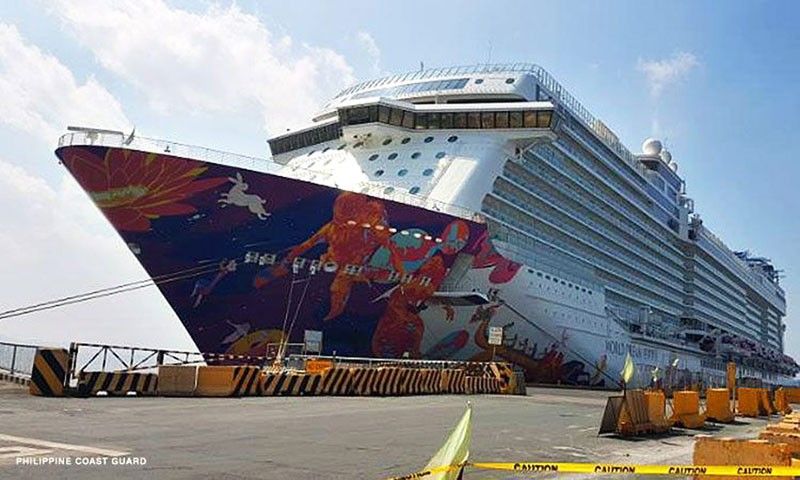2 Chinese ships arrive in Manila

MANILA, Philippines — Two ships - one from Hong Kong and another from China - docked in Manila this week, with close to 800 Chinese passengers allowed to disembark.
But the ship from Hong Kong, which arrived yesterday, was not allowed to proceed to Subic and both vessels were ordered to return to their ports of origin.
The cruise ship passengers were found to be free of symptoms of the novel coronavirus or 2019-nCoV, Philippine health officials assured the public.
Turning back the ships, however, was seen as part of measures to prevent the spread of 2019-nCoV in the Philippines.
Philippine Coast Guard (PCG) spokesman Capt. Armand Balilo said they received notice from port authorities in Subic prohibiting the entry of the World Dream cruise ship with 778 passengers from Hong Kong instead of 4,000 since it did not pick up passengers at China ports.
“The trip of the cruise ship World Dream to Subic has been cancelled. It’s leaving today (Tuesday) on its return trip to Hong Kong. The port state control has given us notice that the ship is not allowed in Subic,” Balilo said.
The port state control is the PCG’s arm that controls the entry of foreign shipping in the Philippines.
The other Chinese vessel, MV Ligulao, arrived on Monday in Manila from Lianyungang, Jiangsu, China. It is set to leave today, the coast guard said. It was carrying vehicles with 20 crew members.
Based on reports, at least eight confirmed cases of coronavirus have been recorded in Hong Kong and 4,500 confirmed cases in China. Death toll stood at 106 as of yesterday morning.
Asked if the passengers were cleared of nCoV, Balilo answered in the affirmative.
“Upon coordinating with the PCG port state control officers at Pier 15, they confirmed that both vessels were cleared and declared safe by the Bureau of Quarantine (BOQ) during the mandatory inspections,” Balilo said.
He added that MV Ligulao passengers were barred from getting off the ship after they failed to secure shore passes from the government.
The BOQ is the government agency responsible for checking the health conditions of passengers of foreign carriers.
Balilo clarified that the PCG could not tell whether a foreign national is infected or not, saying its principal task is ensuring the safety of vessels and their passengers as well as their compliance with maritime safety requirements.
Bureau of Immigration (BI) spokesperson Dana Sandoval said the BI is also involved in recording the number of tourists on a cruise ship that arrives in the country.
Sandoval said that they are also helping the BOQ and the Bureau of Customs (BOC) in monitoring tourists from coronavirus-hit countries and in inspecting cruise ships.
Also yesterday, Olongapo City Mayor Rolen Paulino Jr. sent a letter to Subic Bay Metropolitan Authority (SBMA) chair Wilma Eisma requesting for a temporary ban on cruise ships until after the 2019-nCoV contagion has been controlled.
“Let us please err on the side of caution and put primacy on the health and safety of the residents and workers of SBFZ and the city and municipalities surrounding it,” Paulino said in his letter.
He also stated that similar action has been taken by various cities worldwide in response to threat from the contagion.
But the Department of Health (DOH) said there is no need yet to ban cruise ships as safety protocols are in place at the Port of Subic.
Joseph Macaraeg, chief of the BOQ Subic Station, stressed that implementing safety protocols is a matter of procedure even without any health emergency like the 2019-nCoV.
He said medical quarantine officers normally board a cruise ship at the last port of departure before it sails to Philippine ports.
The SBMA and BOQ also agreed to use the isolation facility at the Subic Bay International Airport (SBIA), which was established during the SARS outbreak in 2003, if a case of 2019-nCoV is detected.
Justice Undersecretary Markk Perete, meanwhile, emphasized that immigration personnel conducting onboard inspection follow protocols to protect themselves from the deadly virus.
“Our officers who board these vessels for immigration inspection, health and sanitation protocols have already been put in place to minimize, if not altogether ensure against, the health hazards related to their work. These protocols were likewise put in place in coordination with our health officials,” he said. -Rudy Santos, Bebot Sison Jr., Roel Pareño, Evelyn Macairan
- Latest
- Trending





























